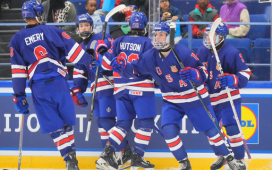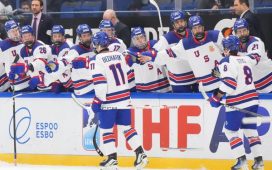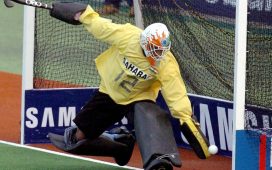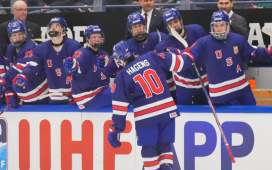Welcome to Simulating The Season. In the wake of the coronavirus outbreak, the NHL has put the 2019-20 campaign on hold without a clear timeline for a return to action. As such, with the help of EA Sports’ NHL 20, we’re attempting to figure out what the rest of the season would have looked like had it not been postponed. Keep in mind, this is not a perfect science and the simulation does not take into account real world circumstances, including current injuries.
• • •
Alas, dear reader, we have reached the end. This is the final instalment of the Simulating the Season series. And true to simulated-season form, the conclusion of the campaign wasn’t without its oddities. And let’s start there.
Though it does not show up in the standings, there was a moment of great confusion in the compiling of the final standings. You see, simulating through the action and tabulating the final results, I had a moment of great consternation when the total of the Detroit Red Wings’ wins, losses and overtime defeats equalled 81 games. The panic doubled when the same was the case for the Toronto Maple Leafs. And the first thought was that somewhere along the line, we had made a gaffe in the standings, left out a result and we would need to pick over the results of the past couple weeks with a fine-toothed comb to discover where the error was made.
Before that could be done, however, I took a quick scan through recent results. And right there, in the final week of the season, was the culprit: somehow, someway, the simulation of the NHL 20 season had the Maple Leafs and Red Wings playing to a 2-2 draw in their April 2 contest. For obvious reasons – you know, like the fact ties no longer exist in the NHL – the game had to be re-simulated, and it turned out to be an important one. The Maple Leafs downed the Red Wings, picking up a crucial two points that made all the difference in their pursuit of the final playoff berth in the Atlantic Division. By Game 82, Toronto’s one-point lead on the Florida Panthers was enough to secure that third seed in the division.
But the oddities didn’t end there, and maybe the most bizarre occurrence of the entire simulated season came in the playoffs. But we’ll save that for the section below where we dive into the round-by-round results.
With that said, thank you for coming along on this journey. We hope you’ve enjoyed it and that it has offered a welcome distraction during this uncertain and stressful time.
Here are the final standings and the full post-season results:
FINAL STANDINGS
PLAYOFFS
ROUND 1
WESTERN CONFERENCE
Winnipeg Jets – 4
Vegas Golden Knights – 2
The Jets have long been awaiting Jack Roslovic’s breakout, and it came in Round 1 against the Golden Knights. He was all over the score sheet in the opening round, leading the charge for the Jets with three goals and six points through the six-game series. His offense paired with the goaltending of Connor Hellebuyck, which was fantastic, helped Winnipeg overcome a disheartening Game 1 overtime loss, in which Winnipegger Ryan Reaves scored the lone goal.
Calgary Flames – 4
Edmonton Oilers – 3
The expectation may have been that this would be a high-flying series and physical, but it was actually rather tame in the simulation. Though it went all seven games, not a single outing was awfully high scoring. Maybe that’s because the Flames and goaltender David Rittich were able to keep Connor McDavid in check. Despite the Oilers captain registering a team-high 22 shots, McDavid finished the series with…one point? Yes, that’s right. He mustered only one assist.
Nashville Predators – 4
St. Louis Blues – 0
Remember a few years back when Pekka Rinne stood on his head in the opening round against the Chicago Blackhawks as Nashville authored a sweep of their division rivals? Well, Rinne was at it again in this one. Against the defending-champion Blues, the Predators netminder allowed just four goals against all series and posted a ridiculous .967 save percentage through four games. He was the difference maker as the Predators skated to a series sweep – and, for those who haven’t spoiled it for themselves, Nashville was just getting started.
Colorado Avalanche – 4
Dallas Stars – 2
Stunningly, this was the only instance in the entire opening round out West that the higher seed actually won their series. And we’ll give you two guesses to figure out who was behind the Avalanche’s success. Nathan MacKinnon was tremendous, posting five points in the six-game set, and he got plenty of help from Colorado’s secondary scorers. For instance, Vladislav Kamenev notched three goals in the series, Matt Nieto had four points and J.T. Compher found twine four times in the series.
EASTERN CONFERENCE
Washington Capitals – 4
Columbus Blue Jackets – 2
The Blue Jackets’ goaltending couldn’t have fallen apart at a worse time. Against the Metro-best Capitals, Columbus did its best to stay in the series offensively and Washington’s Braden Holtby was no brick wall, but Joonas Korpisalo was somehow worse for the Blue Jackets. In six games, he allowed more than three goals against per game and couldn’t be the last line of defense Columbus so sorely needed. In the end, Alex Ovechkin and Co. were too much.
Pittsburgh Penguins – 4
Philadelphia Flyers – 3
When the simulation started, few clubs were better than the Flyers. Philadelphia was white hot and used their momentum to climb, if only temporarily, to the top of their division. It appeared the Flyers were again about to embark on a hot streak, too, as they jumped out to a 3-0 series lead. But then it happened. Game-by-game, the Penguins picked away at the deficit, and by the time Game 7 came about, Pittsburgh had all the momentum and won their way through to the second round. Surely, this will sit well with Flyers faithful.
Boston Bruins – 4
Florida Panthers – 3
The Eastern Conference was infinitely more exciting in the first round than the Western Conference, and the second Game 7 is a major reason why. Not only did the Bruins and Panthers trade victories, but the series featured four separate contests that needed extra time. If at least a couple of those games had gone the other way, too, the Cats likely would have beaten the Bruins, but Boston won three of the four overtime tilts and used that to propel themselves to the series victory.
Tampa Bay Lightning – 4
Toronto Maple Leafs – 2
Is it possible to be talented at the wrong time? Because it sure feels as though that’s the case for the Maple Leafs. Though they’ve done themselves few favors in the post-season in recent years, getting out of the Atlantic Division at a time when Boston and Tampa Bay are two of the top teams in the entire league is a herculean task. And it’s not one Toronto completed in our simulation. Valiant efforts from John Tavares, Mitch Marner and Kasperi Kapanen were all for naught as the Bolts won in six.
ROUND 2
WESTERN CONFERENCE
Calgary Flames – 4
Winnipeg Jets – 0
David Rittich was out of his mind in this one. In the four games between the Canadian clubs, the Flames netminder posted a pair of shutouts and Elias Lindholm did the rest, scoring four goals and eight points in the four-game series. Despite Mark Scheifele’s best effort – he had a hat trick in Game 1 – the Jets were simply overrun by the depth of the Flames.
Nashville Predators – 4
Colorado Avalanche – 0
OK, before we get into this, I want to remind everyone: this is a simulation using NHL 20. The results have not been pulled out of thin air. Each games is simulated once, and whatever happens is what we’ve reported here. That said, the Predators went out and swept another series, again on the strength of Pekka Rinne’s play. Not to be outdone by the Flames’ Rittich in the other conference semi-final, Rinne posted a shutout in the series-clinching game to book Nashville’s ticket to their second conference final in four seasons.
EASTERN CONFERENCE
Pittsburgh Penguins – 4
Washington Capitals – 1
A rivalry renewed! In what seems like the perennial post-season battle between these two clubs, Pittsburgh got the upper hand early and refused to falter. Led by Evgeni Malkin and Sidney Crosby – who else, really? – the Penguins jumped out to a 3-0 series lead before the Capitals staved off defeat in Game 4. It was only temporary, however, as Pittsburgh lambasted Washington 6-1 in the series finale and punched a ticket to the conference final.
Tampa Bay Lightning – 4
Boston Bruins – 1
For the better part of the back half of the season, the Bolts were chasing down the Bruins. But when it came time for the two teams to finally duke it out in the post-season, it was Boston who spent much of their time chasing Tampa Bay. The Lightning leapt out to a 2-0 series lead, the Bruins counterpunched with a win of their own and then that was followed by two more Tampa Bay wins to take the series. Andrei Vasilevskiy was the hero here, blanking the Bruins twice in the series.
ROUND 3
WESTERN CONFERENCE
Nashville Predators – 4
Calgary Flames – 0
Yes. Seriously. This is what happened. You can view it below in all of its glorious weirdness. The Predators swept a series for the third consecutive round, and again it was Rinne who was the first star. He had more help in this round than any of the two prior, however, as Ryan Johansen, most noted for his playmaking ability, chipped in five goals in the four-game series victory. There’s not much to say about Calgary, as they flamed out spectacularly after a dominant second-round victory.
EASTERN CONFERENCE
Pittsburgh Penguins – 4
Tampa Bay Lightning – 2
Despite how relatively close this series was, it was far and away Matt Murray’s best effort of the post-season. The Penguins keeper posted two shutouts in the round and singlehandedly won those contests for Pittsburgh. Meanwhile, Evgeni Malkin scored four goals in the series and Jason Zucker potted four as the Penguins won the Eastern Conference crown and helped set the stage for a rematch of the 2017 Stanley Cup final.
STANLEY CUP FINAL
Nashville Predators – 4
Pittsburgh Penguins – 2
Let’s take this time to talk about Pekka Rinne’s overall playoff performance, as the individual statistics are less interesting than the Conn Smythe winner’s numbers. In the 18 games he played in the post-season, Rinne mustered a ridiculous .947 SP, 1.60 goals-against average, three shutouts and allowed only 29 goals. To put his simulated performance into real life context, no goaltender in recorded NHL history who has appeared in at least a dozen playoff games has posted a SP better than Rinne’s .947 and the 16-2 record matches the mark set by Grant Fuhr during the 1987-88 playoffs. Rinne’s performance was superhuman, even for a simulation.
Playoff Scoring Leaders
T1. Evgeni Malkin, PIT (8-13–21)
T1. Sidney Crosby, PIT (7-4–21)
3. Steven Stamkos, TBL (8-11–19)
T4. Nikita Kucherov, TBL (9-9–18)
T4. Jason Zucker, PIT (8-10–18)
6. Ondrej Palat, TBL (1-14–15)
T7. Patric Hornqvist, PIT (9-5–14)
T7. Ryan Johansen, NSH (8-6–14)
T7. Viktor Arvidsson, NSH (6-8–14)
T7. Filip Forsberg, NSH (5-9–14)
T7. Calle Jarnkrok, NSH (5-9–14)
T7. Bryan Rust, PIT (3-11–14)
T7. Brayden Point, TBL (2-12–14)
T7. Kyle Turris, NSH (2-12–14)
Playoff Goaltending Leaders
1. Pekka Rinne, NSH (16-2, 3 SO, .947 SP)
2. Mike Smith, EDM (3-4, 1 SO, .933 SP)
3. Connor Hellebuyck, WPG (4-6, 1 SO, .927 SP)
4. Matt Murray, PIT (14-10, 3 SO, .927 SP)
5. Sergei Bobrovsky, FLA (3-4, 0 SO, .925 SP)










